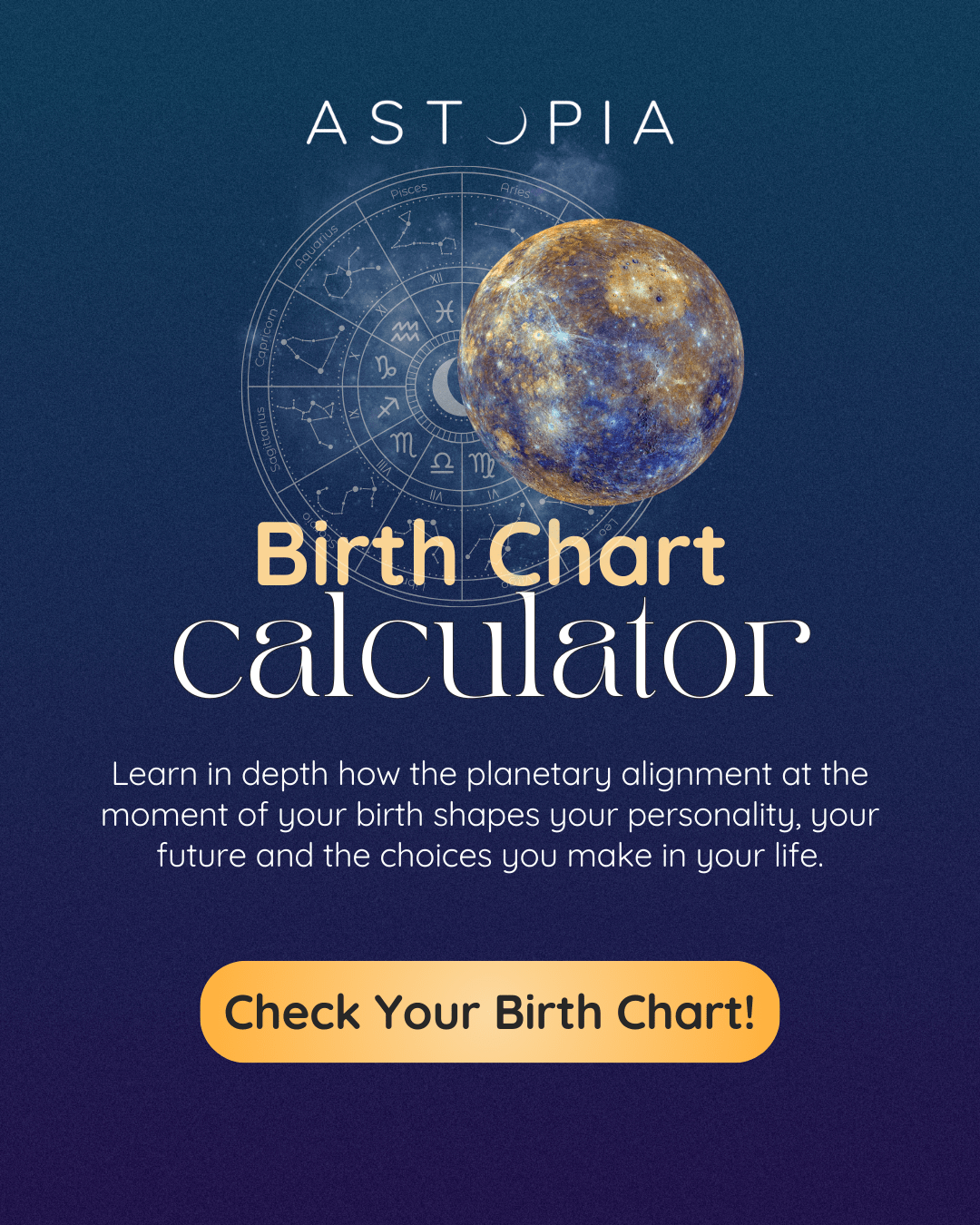
1/23/2024
Author: Astopia TeamAstrology and Astronomy: From Ancient Unity to Modern Duality
The sky has always been a source of great curiosity and fascination throughout human history. This mysterious structure of the sky gave rise to two different, but once intertwined, disciplines: astrology and astronomy. In ancient times, these two fields were closely connected and sought to understand the effects of celestial events on human life. But over time, the relationship between astrology and astronomy has changed and each has evolved in its own way. In this blog, we will examine the main differences between astrology and astronomy, the historical origins of each and their roles in the modern world. We will also talk about the historical connections of these two disciplines and how they began to follow separate paths.Don't forget to visit Astopia App to dive deeper into astrology and take firm steps on your own journey!
What is Astrology
Astrology is a mysterious and fascinating field that studies the relationship between universal energies and human life. Comments are usually made on horoscopes, celestial events and celestial bodies. As you may have heard, astrology suggests that the positions of the stars and planets have an impact on people's personality traits, emotional states, and even fate. This has been a topic of curiosity since ancient times.
The foundations of astrology are based on the analysis of the birth chart. The natal chart shows the state of the sky at the time a person was born. Astrology tries to interpret a person's characteristics, life path and potential using this map. The main elements of astrology include the zodiac wheel, 12 houses, the sun, the moon and other planets, the aspects celestial objects form, as well as the 12 zodiac signs.
Astrology is often confused with astronomy due to the similarity of names and the similarity of the subjects they deal with. In fact, one of the reasons for this is that it has enabled the development of metaphysical fields such as astrology and branches of science such as astronomy throughout history. There is a similar connection between ancient astrology and modern astronomy: Just as alchemy gave birth to chemistry…
What is Astronomy
In your astrology journey, it is important to know the basic concepts of astronomy to understand the mysteries of the sky. Astronomy is a branch of science that studies the movements, properties and formations of celestial bodies in the universe. He works on a wide range of topics, including the solar system, stars, planets, galaxies and the universe itself. Astronomy helps us understand celestial events and the structure of the universe, so we can take a more conscious approach in its relationship with astrology.
This branch of science observes the depths of the universe using telescopes and other observation instruments. Thanks to astronomy, we can monitor the movements of objects in the Solar system and beyond and discover their physical and chemical properties. For example, the effects of the Sun and the Moon on natural events are understood through astronomical observations. This information provides us with basic information about planetary movements and celestial events used in astrological predictions and interpretations.
Astronomy has been both a science and a subject of curiosity for humanity for many years. Although these two fields are completely independent of each other today, they complement each other while trying to unravel the secrets of the sky.
Key Difference Between Astrology and Astronomy
Astrology and astronomy are two fundamentally different fields that share our interest in the sky. So, what are these differences?
- Astrology is a field that studies the effects of stars, planets and other celestial bodies on people. According to astrological belief, the positions and movements of these celestial bodies can play a determining role on people's personality traits, emotional states and life events. Astrology is viewed primarily as a belief system and is not supported by scientific evidence. With concepts such as horoscopes, birth charts and planetary movements, it can help individuals understand themselves better and give meaning to the events in their lives.
- Astronomy is a branch of science that studies the universe and the celestial objects within it with scientific methods. It investigates the physical and chemical structure, movements and formation processes of stars, planets, galaxies and other elements of the universe. Astronomy is a scientific discipline based on observations and theories. It examines topics such as the solar system, stellar evolution, galaxy dynamics and the expansion of the universe.
In short, while astrology relates human life to celestial bodies with a personal and metaphysical approach, astronomy investigates the universe with objective and scientific methods. The most obvious difference between these two fields is that astrology does not have a scientific basis and is aimed more at personal discovery and guidance. Astronomy, on the other hand, reveals scientific facts about the functioning of the universe and is a constantly developing branch of science.
Concept Confusions and Common Confusions
Astrology and astronomy are two disciplines that are often confused. Although they are both related to the sky and space, the differences between them are quite noticeable. Astrology is a field that studies the effects of stars and planets on human life, used as a symbolic language and psychological tool. On the other hand, astronomy is a branch of science that investigates the structural and physical properties of the universe using scientific methods.
A common confusion is the misconception that astrology has a scientific basis. However, astrology is not based on scientific methods and evidence; It is based more on symbolism, personal interpretation and metaphysical concepts. Astronomy, on the other hand, adopts a scientific approach based on observations and experiments to understand the nature of the universe.
Evolution of Astrological and Astronomical Thought
Although astrology and astronomy have followed different paths throughout human history, they both reflect humanity's curiosity about the sky and its efforts to understand the universe. The different aspects of these two fields, developing from their common origins, demonstrate the diversity of human thought and belief, both in the past and today. Here are the important breaking points in the evolution of these two fields:
- In ancient times, astrology and astronomy were studied in the same field. It was used to observe the sky, understand seasons, agriculture and time.
- During these periods, astronomy acquired a more scientific basis. Astrology continued to be used to understand people's fate and character.
- With the scientific revolution in the 16th and 17th centuries, astronomy clearly emerged as a scientific discipline. During this period, laws were developed that explained the movements of celestial bodies.
- Today, while astronomy uses advanced technologies and mathematical models to understand the structure and nature of the universe, astrology is more associated with personal development and spiritual pursuits.
- Thanks to advances in space exploration and telescope technology, astronomy is exploring previously unknown areas of the universe.
- Astrology still attracts a wide audience in daily life, especially in popular culture, with horoscope interpretations and personal predictions.
The Role of Astrology and Astronomy in Various Cultures
Astrology and astronomy have always held an important place in human history and have developed in different ways in different cultures. Now let's take a look at the adventure of these two disciplines from ancient civilizations to the present day.
Ancient Civilizations and Celestial Observations
- Mesopotamia:Mesopotamia was one of the pioneer civilizations in the field of astrology and astronomy. They recorded the movements of the planets by observing the sky and used this information both in agricultural activities and in rituals and religious ceremonies.
- Sweetcorn: Ancient Egyptians used the positions and movements of the stars to predict flood periods of the Nile River. The sky had both mystical and practical significance for them.
- Greece: The Greek civilization developed mathematical models of the celestial bodies. Astronomy and astrology were popular subjects among Greek philosophers, and this formed the basis of these fields in the Western world.
The Renaissance and the Rise of Scientific Research
- Nicolaus Copernicus: Copernicus revolutionized astronomy by proposing the Sun-centered model of the universe. This provided a new perspective in understanding the movements of celestial bodies.
- Galileo Galilei: With the invention of the telescope, Galileo observed the sky like never before and published his observations to the scientific community, resulting in a major advance in the field of astronomy.
- Johannes Kepler: Kepler developed mathematical laws that explained the motions of the planets, and this made the difference between astronomy and astrology even more clear.
Enlightenment and Separation of Disciplines
- Development of the Scientific Method: The Age of Enlightenment brought the scientific method and critical thinking to the fore. During this period, more scientific and experimental methods began to be used to explain celestial events.
- Separation of Astrology and Astronomy:As the line between science and mysticism became more distinct, astronomy established itself firmly among the hard sciences, while astrology remained more of a metaphysical and symbolic field.
- Modern Approaches:Today, while astronomy advances with scientific research in our effort to understand the universe, astrology is seen as a tool used to discover individual and collective subconscious symbols. Both provide in-depth knowledge and understanding in their respective fields.
Astrology and Astronomy in Practice
Astrology and astronomy are two different disciplines that have existed for a long time in human history. While these two areas were quite close to each other in the past, they took separate paths over time. To understand this distinction, let's first examine the basis of each and how it is applied today.
Beliefs That Support Astrology
The basis of astrology is the belief that planets and stars have an impact on people's personalities, behaviors and lives. This belief is a mindset that has been ingrained in many cultures since ancient times. Here are some beliefs that form the basis of astrology:
- Universal Connection: The idea that the universe as a whole and everything in it is interconnected and that this connection affects human life is one of the cornerstones of astrology.
- Birth Chart: It is the belief that the position of the planets and stars in the sky at the time a person is born affects that person's character and life path. A natal chart is a chart showing these positions.
- Effect of Planets: The idea that each planet has special energies and qualities and that these energies can affect people's emotional, mental and physical states.
- Zodiac Signs: As the Sun, Moon and planets move through the 12 signs of the Zodiac, it is believed that each sign carries certain characteristics and energies.
Modern Applications of Astrology and Astronomy
Astronomy is a branch of science that studies the universe from a scientific perspective. Modern astronomy studies the movements and structures of celestial bodies and the formation of the universe. Thanks to telescopes and space exploration, our knowledge of the universe is increasing.
Astrology, on the other hand, tries to interpret the effects of planets and stars on human life and destiny, with a more personal and spiritual approach. Today, astrology is mostly used for personal development, relationships and future predictions. Astrological consultancy appears in various forms, such as daily horoscopes in newspapers and online astrology services.
These fundamental differences between astrology and astronomy show that both fields have a rich and deep history in themselves. Even though they are considered separate disciplines today, their journey and impact on human history are still a matter of great curiosity and interest.
The Future of Astrology and Astronomy
With the advancement of technology, exciting developments are taking place in the field of astronomy. In particular, space telescopes, advanced observation techniques and data analysis methods expand the boundaries of astronomy. These developments allow us to explore previously unknown aspects of the universe.
In addition, the use of artificial intelligence and machine learning technologies is creating a major transformation in space exploration. For example, thanks to these technologies, it becomes possible to detect celestial objects faster and more accurately. New discoveries shed light on the future of space exploration by enabling us to better understand the structure and evolution of the universe.
The Cultural Resurgence of Astrology
Nowadays, astrology is gaining popularity again and attracts great attention, especially among the younger generations. This interest is increasing as astrology becomes more visible on social media and digital platforms.
Astrology is used as a tool for personal development and self-awareness, helping people better understand themselves and their environment. It is also seen as a guide for coping with the stresses and uncertainties of daily life. Astrology holds an important place in modern society as part of the search for cultural and personal meaning.
Can Astrology Be Considered a Science?
Astrology and science use fundamentally different approaches and methodologies. While science is based on observable events and provable hypotheses, astrology uses more symbolic and metaphorical language and is based on personal experiences. It seems difficult for astrology to be accepted as a scientific discipline because it is not compatible with the basic principles of science.
How Does Astrology Affect Modern Society?
The influence of astrology in modern society is deeply embedded in individuals' lifestyles and worldviews. Astrology can guide us in many areas, from our daily decisions to our relationships and career plans. Especially during times of uncertainty and change, people may turn to astrology to seek clues and guidance about their future.
Additionally, astrology plays an important role in creating a sense of connection and community in society. People can have a common understanding and solidarity with other individuals who share similar zodiac signs. This is reflected in the popularity of astrology-themed groups and discussion platforms, especially on social media and online communities.




